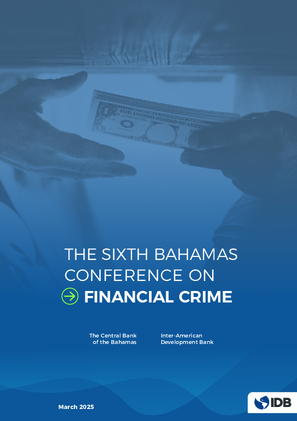The Sixth Bahamas Conference on Financial Crime
Date issued
Apr 2025
Subject
Money Laundering;
Financial Crime;
Regulation;
Small Business;
Crime and Violence;
Big Data;
Private Sector
JEL code
F51 - International Conflicts • Negotiations • Sanctions;
F42 - International Policy Coordination and Transmission;
F53 - International Agreements and Observance • International Organizations;
G28 - Government Policy and Regulation
Category
Learning Materials
The Sixth Bahamas Conference on Financial Crime, co-hosted by the Central Bank of The Bahamas and the Inter-American Development Bank in January 2025, brought together over 390 participants, both in-person and online, including policymakers, regulators, academics, private sector professionals, and representatives from regional and international institutions. The conference featured research papers, grouped into five thematic blocks: the overall effectiveness of anti-money laundering (AML) frameworks; the role of big data and new technologies; applied insights from regulators and compliance professionals; the use and misuse of AML laws; and transnational patterns in financial crime and regulatory responses. The first theme explored the core question of whether AML systems have been effective after three decades of implementation, prompting critical reflection on performance measurement, unintended consequences, and reform prospects. The second block examined how big data, machine learning, and digital monitoring tools are being deployed albeit unevenly to detect financial crime and improve institutional responses. The third set of papers focused on practical regulatory strategies, highlighting the value of empirical, risk-based supervision and the need to reassess overly burdensome or ineffective compliance requirements. A fourth theme raised concern over the abuse of AML laws to target political opponents and restrict civil society, revealing troubling patterns across both authoritarian and democratic contexts. Finally, a fifth group of contributions addressed the international dimensions of financial crime including illicit network mapping, the evolution of tax information exchange, and the regional impact of de-risking on small economies. The conference emphasized the challenges to close the distance between AML research and practice, the limitations of current enforcement models, and the urgent need for more targeted, evidence-driven, and context-sensitive approaches to financial crime prevention.
NO



